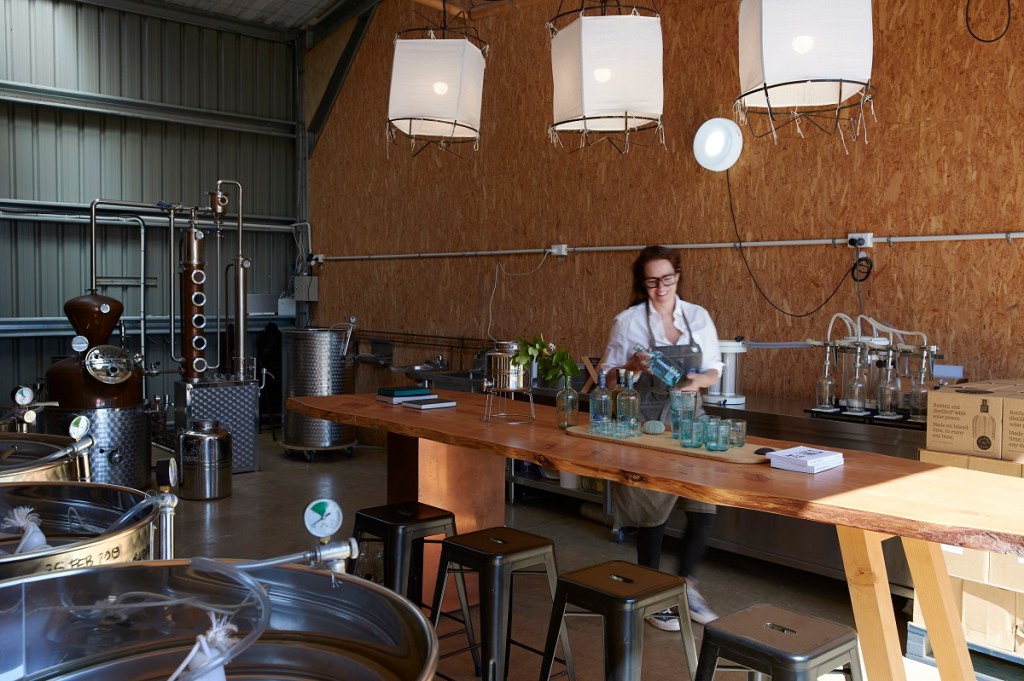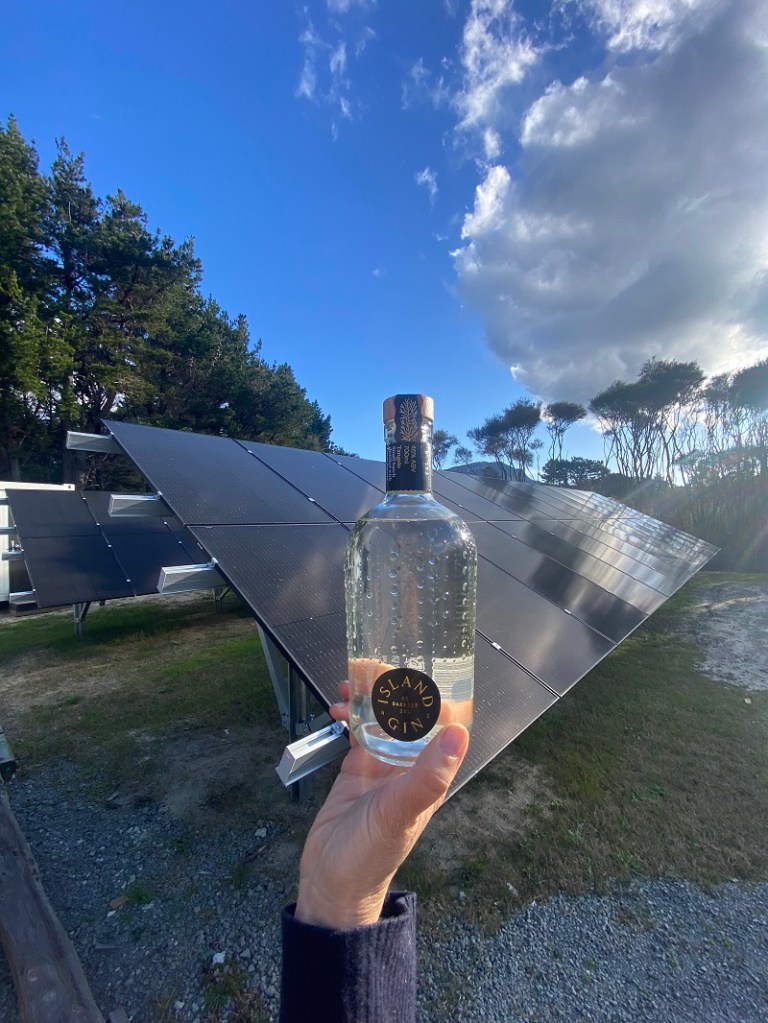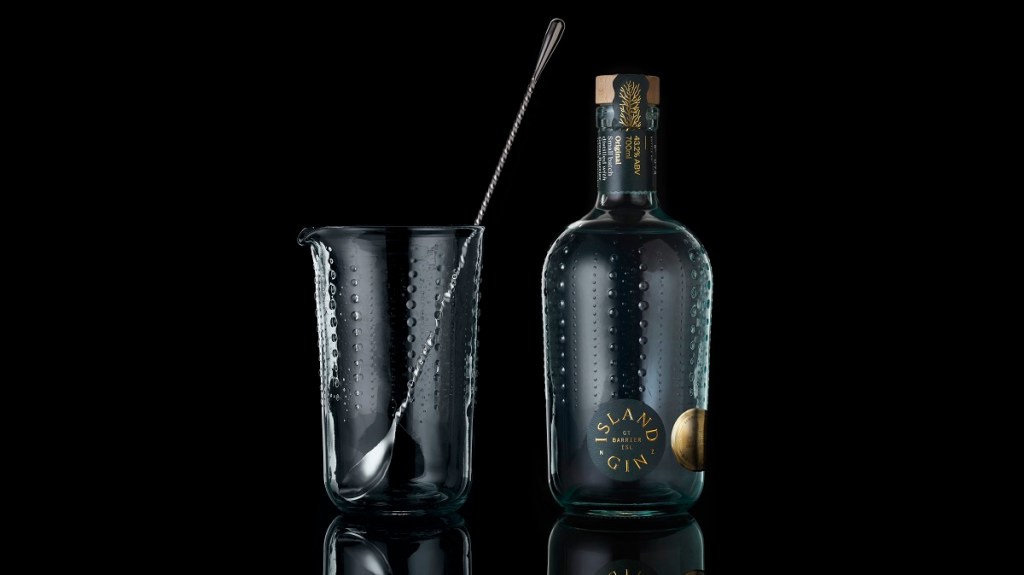Winner of the New Zealand Best in Country award at the 2024 World Gin Awards, Island Gin seeks to protect its pristine local environment by distilling off-the-grid and taking a hyperlocal approach to its botanicals.
Head Distiller Andi Ross’s passion for environmental sustainability comes from a desire to protect her home of Great Barrier Island, located five hours off the coast of Auckland.
“About 1100 people live here, and over 60 per cent of the island is protected by the Department of Conservation. We’re trying to look after the environment as much as possible, so we try to make every touch point of the business environmentally sound. We’re trying to look after our unique island,” she said.
The unique location and surrounding community had a significant impact on the gin itself, with Ross opting for a local ingredient as one of the main flavours in the gin.
“We wanted to make a product that was quintessentially New Zealand, so Manuka bush honey is our key ingredient. We have a few apiaries on the island, and we work with a really fantastic one about 10 minutes down the road. Jaques, the apiarist, has planted a huge amount of banksia, olive trees, and other pollinators. It’s very local, and given that the bee population is in decline, it’s important to support that.
“We could have used kawakawa, or one of the other native botanicals, but other brands are already using those in their gins. We wanted to do something that is quite unique,” she said.

Supporting the local community is important for Ross, which she does through employing locals in the distillery and supporting local artisans. The main table in the distillery is made from local Macrocarpa wood with legs crafted by the local coppersmith, and the distillery’s still, Frank, also features a nameplate crafted by the same coppersmith.
These connections with the local community help the circular economy across the island, with Island Gin sending its spent botanicals to the local refuse centre for processing into compost, and making limited edition gins from excess produce from around the island.
“Our apiarist has lots of peach and tangelo trees, so he will ring me if he has a surplus of fruit. Rather than the fruit rotting on the ground, I’ll bring the fruit back to the distillery and make a limited-edition gin,” Ross said.
“Then, I take the peels, and there’s a guy on the island that makes jam. It’s called Slow Jam, because it takes longer, but it has less sugar and he uses those peels in his jam. It’s quite a tight knit community on the island, so we’re always thinking of ways to support each other.”
Distilling off-the-grid
In addition to aiming for sustainable use and disposal of its botanicals, Island Gin does not use mains power or water in its operations. Water is sourced from filtered rainwater, and solar panels provide almost all of the site’s power.
“There are some days that are cloudy, which affects the solar panels. We didn’t want to bring a new generator onto the island, so we used an old generator from a place called Stonewall Store down the road. I set that up in 2019 when we started distilling, and it kept us going until we got the solar panels in and switched everything across. Some days, we have to run the generator for an hour or two in the morning, but as soon as the sun hits the panels, we’re back up and running on solar,” Ross said.
Operating off-the-grid, as well as the remote location, provides unique challenges, which the Island Gin team addresses with careful planning.
“I didn’t realise how hard it was going to be until I started. You don’t know what you don’t know. Being so far away from everything, everything we need comes across on the barge,” Ross said.
“We need to think six months ahead of time. We have a lot of storms, especially in the winter, so when the barge doesn’t come, you can’t get anything. We need to store a lot of ingredients on site, and we have two of everything. For the still, I have a lot of gear because I know that I can’t replace it immediately.”

A distinctive bottle
Island Gin’s natural influences are immediately evident through its bottle, which is inspired by the kina shells that wash up on the island’s beach.
“It would have been easy for us to find a bottle offshore, but we’re trying to limit what comes onto the island, so we didn’t want to do that. I’m an ex-graphic designer, so I wanted the bottle to be uniquely New Zealand. Kina shells are all around us, and they wash up on the island a lot, so I thought it could be an interesting design for the bottle,” Ross said.
The bottles are produced by the Visy facility in Auckland and made from 50 per cent recycled glass.
“Most of the glass in New Zealand ends up going back to the facility in Auckland. Visy is the only place where you can get bottles made in the whole country,” Ross said.
As well as the bottled being recyclable, Island Gin sells pourers to turn empty bottles into olive oil decanters and are often repurposed into jugs and glasses. On Great Barrier Island, the local Irish pub, The Currach, uses the empty bottles as water carafes.

Ross would like to see more opportunities for small producers to source bottles close to home.
“Glass is a big issue, and the entry level to getting a bespoke bottle made is very high. I think a lot of distilleries would like to make their own bottles locally, so it would be great to see these packaging companies open the doors to the wider spirits industry,” she said.
More broadly, Island Gin seeks to reduce waste in its packaging, using recyclable paper tamper seals rather than plastic shrink wrap seals, and ensuring labels and packaging are recyclable or compostable.
“From a packaging perspective, I think it’s important for distillers to reduce plastic and waste as much as possible.
“You can still have a beautiful, elegant, premium design without all that extra landfill,” Ross said.
Though Island Gin does not currently have an Australian distributor, Ross prefers to work directly with independent retailers, as they are able to share the brand’s story more effectively.
“We like to have direct relationships with the retailers that sell our products, so we find that boutique stores are a good fit. Because it is a super-premium product, they have time to spend with the consumer and talk about the flavour profiles, where we produce the gin, and how difficult it is to produce it here. It’s really important to us to get that message across.”



